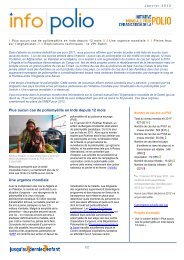national primary health care development agency - Global Polio ...
national primary health care development agency - Global Polio ...
national primary health care development agency - Global Polio ...
You also want an ePaper? Increase the reach of your titles
YUMPU automatically turns print PDFs into web optimized ePapers that Google loves.
Version 13312<br />
Kano, Sokoto and Kebbi States by March. A scale up this program is planned next for Zamfara and Jigawa<br />
states. The Mobilizers are expected to engage families, promote immunization and keep a line list of all<br />
children under the age of five.<br />
• Initiate an outreach campaign to map, engage and mobilize religious leaders (imams, madrassa<br />
headmasters, etc.) in high risk areas. The major cause of non-compliance has been religious belief.<br />
• Build awareness and political support of LGA Chairmen in collaboration with ALGON. This will ensure<br />
oversight of the program at the highest level. LGA Chairmen will be required to participate in supervision<br />
of SIAs and RI, coordination and physical attendance of daily review meetings during implementation in<br />
addition to release of funds for activities<br />
• Strengthen the engagement and involvement of Faith-Based and Community Based organizations<br />
(FORMWAN..) in mobilizing communities particularly in the highest risk areas.<br />
National advocacy teams will visit the high risk states for advocacy to State Governors, members of National<br />
and State legislatures and other top government officers. Advocacy kit and guidelines will be developed to<br />
support the states in advocacy to LGAs.<br />
6. ACCELERATING ROUTINE IMMUNIZATION DELIVERY<br />
Efforts will be targeted towards improving RI coverage particularly in those LGAs at highest risk for continued<br />
WPV circulation. Potential interventions will include:<br />
• The highest risk LGAs will be supported to develop evidence based micro-plans to improve routine<br />
immunization service delivery through fixed, mobile and outreach services. A rapid participatory review of<br />
the critical barriers to consistent delivery and uptake of routine immunization in these areas will be<br />
conducted as first step and the findings used to prepare cost-effective routine immunization acceleration<br />
activities in these areas.<br />
• Mobilize the required human resources, including wherever necessary retired <strong>health</strong> workers and provide<br />
adequate logistics, including vaccines and cold chain, to support the accelerated routine immunization<br />
activities in the highest risk areas.<br />
• Strengthen linkages with Traditional Birth Attendants in mobilizing mothers and <strong>care</strong>takers in the targeted<br />
high risk communities to consistently utilize routine immunization activities.<br />
• Strengthen linkages with Traditional leaders in supporting accelerated routine immunization activities in<br />
the targeted areas.<br />
• Conduct of three rounds of LIDs between May & November in LGAs with particularly low RI coverage<br />
• Initiation of outreach effort in 10-15 LGAs, focused primarily in Kano and Jigawa, with persistent cVDPV<br />
transmission. This project will be coordinated by NPHCDA, State and LGA immunization teams, WHO,<br />
UNICEF and NGO partners.<br />
• Newborn children are to be tracked and immunized through MSS facilities. OPV is also to be pre-placed in<br />
delivery rooms to ensure administration of birth dose of OPV.<br />
12




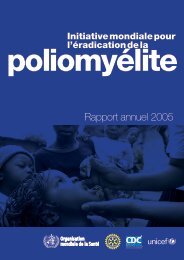
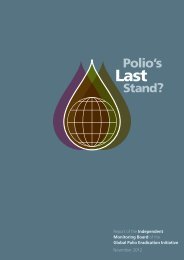
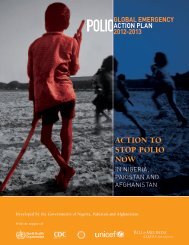
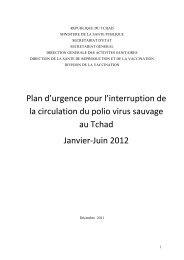
![English [pdf 2MB] - Global Polio Eradication Initiative](https://img.yumpu.com/6380394/1/190x245/english-pdf-2mb-global-polio-eradication-initiative.jpg?quality=85)
